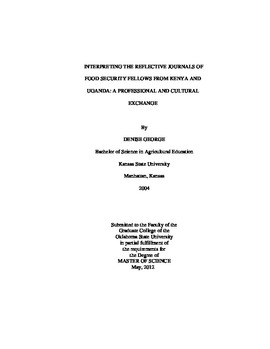| dc.contributor.advisor | Edwards, M. Craig | |
| dc.contributor.author | George, Denise | |
| dc.date.accessioned | 2014-04-15T18:36:10Z | |
| dc.date.available | 2014-04-15T18:36:10Z | |
| dc.date.issued | 2012-05-01 | |
| dc.identifier.uri | https://hdl.handle.net/11244/8380 | |
| dc.description.abstract | The population for this study was the 14 policymakers, community leaders, and media professionals from Kenya and Uganda who participated in the grant-funded project aimed to reduce food insecurity by catalyzing communication networks between those groups. The study assessed perceptions of the Food Security Fellows regarding the culture and people of the United States, the benefits and challenges of participating in an international internship/job shadowing experience, and the training experiences that resonated with the Fellows regarding their professional roles and how they could improve food security in their respective countries. A qualitative content analysis was used to analyze the reflective journal entries of the participants. Based on the journal entries, the Fellows were skeptical of how they would be treated in the United States, including fears of racism, but still excited to see the United States and learn from experts in their career fields. During their five-week stay, they described experiencing a welcoming and generous spirit when interacting with Americans and some indicated a desire to return to the United States to pursue an advanced degree. Related to their internship/job shadowing experience, the Fellows desired hands-on, job-specific tasks. Media professionals were given more specific tasks to complete (i.e., wrote news stories, produced television segments) than community leaders and policy makers who were given more passive roles of "shadowing" or observing. Nevertheless, the Fellows were grateful for the opportunity to learn how professional tasks were done in the United States and share ideas with their internship/job shadowing hosts. Based on their programming experiences, the Fellows indicated that a significant need existed to involve the youth of their respective countries in agricultural endeavors to promote careers in agriculture. The participants also recognized the need for Extension services in Kenya and Uganda to more effectively link with teaching and research (i.e., similar to the U.S. land-grant university model), which could improve agricultural production and efficiency. And the Fellows traveled back to Africa empowered with the belief they could make a difference in their countries, especially in regard to improving food security and reducing hunger. | |
| dc.format | application/pdf | |
| dc.language | en_US | |
| dc.publisher | Oklahoma State University | |
| dc.rights | Copyright is held by the author who has granted the Oklahoma State University Library the non-exclusive right to share this material in its institutional repository. Contact Digital Library Services at lib-dls@okstate.edu or 405-744-9161 for the permission policy on the use, reproduction or distribution of this material. | |
| dc.title | Interpreting the Reflective Journals of Food Security Fellows from Kenya and Uganda: a Professional and Cultural Exchange | |
| dc.type | text | |
| dc.contributor.committeeMember | Sitton, Shelly | |
| dc.contributor.committeeMember | Cartmell, D. Dwayne, II | |
| osu.filename | George_okstate_0664M_12041.pdf | |
| osu.college | Agricultural Sciences and Natural Resources | |
| osu.accesstype | Open Access | |
| dc.description.department | Department of Agricultural Education, Communications, and Leadership | |
| dc.type.genre | Thesis | |
| dc.subject.keywords | food security | |
| dc.subject.keywords | international experiences | |
| dc.subject.keywords | reflective journaling | |
